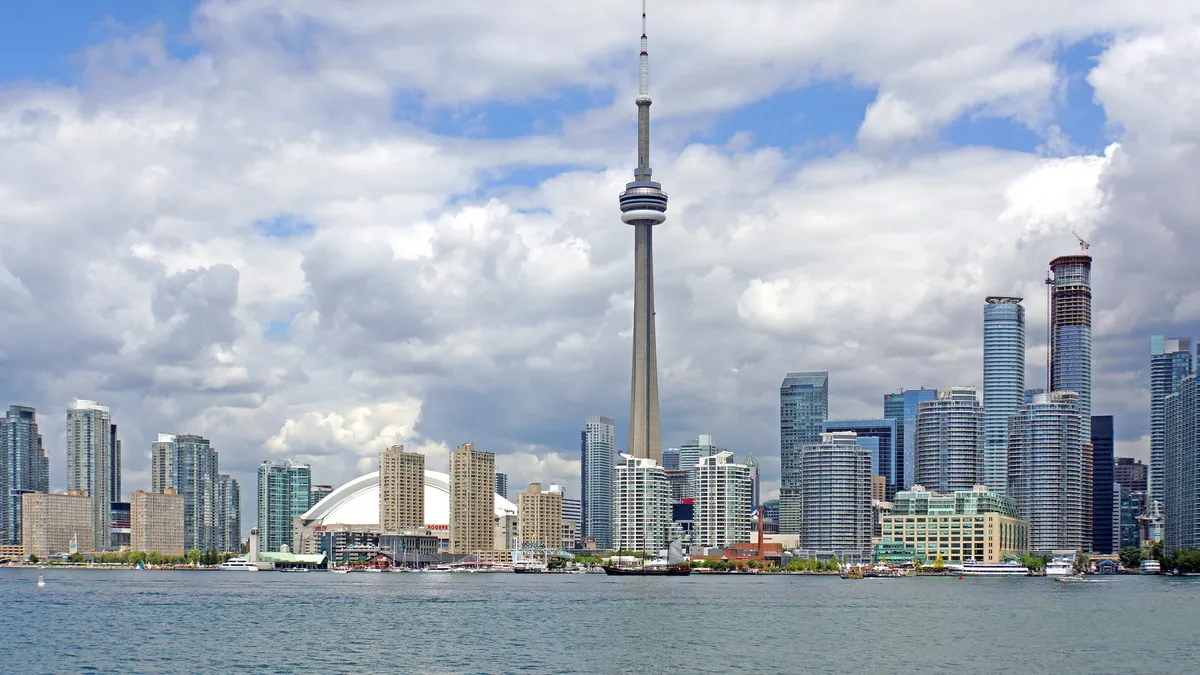Dive Brief:
- Cities' economic recovery from the new coronavirus (COVID-19) will be a "long road," speakers said on a webinar Thursday hosted by the International Economic Development Council (IEDC). They also warned local leaders should not let up on social distancing and other policies designed to slow down the spread of the pandemic.
- CEO of Greater Seattle Partners Brian McGowan said the city has seen major impacts, with 1 million jobs at risk in the region. Hotel occupancy has dropped to 18% compared to 76% this time last year and major employers like Boeing have shuttered operations, he said.
- Despite President Trump's recent announcement that he wants the country to function again as normal by Easter, local leaders have said that plan is not realistic and the best way to ensure economic recovery is to stop the pandemic’s spread. "As long as this pandemic is amongst us, our economies will suffer," Mike Williams, general manager at the City of Toronto, said during the webinar. "So the most important economic action is actually a public health action, which is to stop the spread."
Dive Insight:
The spread of the coronavirus has ravaged many cities and forced a variety of responses including social distancing and shelter in place advisories in some areas.
Before the spread of the virus, city economies were humming with not enough talent to fill available jobs, in addition to having a lack of office space and affordable housing, Jeff Finkle, IEDC's president and CEO, said on the webinar. But COVID-19 has brought an "abrupt halt to this frenzy" and it will take a big effort to recover, he said.
Help should be on the way from the federal government. The Coronavirus Aid, Relief, and Economic Security Act (CARES Act) includes $1.5 billion for the Economic Development Administration (EDA) to help localities recover after the pandemic, as well as $562 million for the Small Business Administration (SBA) to provide emergency loans to businesses.
Meanwhile, the Federal Emergency Management Agency (FEMA) will be given the ability to reimburse cities for expenses associated with coronavirus mitigation. That bill has won approval in the U.S. Senate, and is expected to be voted on today by the U.S. House of Representatives.
Kenny McDonald, president and CEO of OneColumbus in Columbus, OH, said the biggest point of emphasis should be supporting small businesses, helping them pay their workers and remaining stable. He said it will be key to make sure the money flows down from the federal government as quickly as possible. "I think speed is as important as content at this point," McDonald said.
In the immediate term, Williams said Toronto has been looking to mitigate some of the worst economic impacts for its small businesses, especially as the city’s hotel occupancy rate is lower than Seattle's. He said the city has been working hard at a "Digital Main Street" initiative to help small businesses start operating online, something that will be key now and in recovery.
"It's amazing how many weren't already proficient in that, and clearly this is important right now, but more importantly into the future, as I think this will change consumer habits for good in many ways with respect to retail," Williams said.
But while it may be tempting for cities to try and rush to get back to normalcy, Williams said Toronto’s experiences dealing with severe acute respiratory syndrome (SARS) in 2002 and 2003 should serve as a lesson. Then, the city had tried to go back to normal too soon, leading to a second wave of cases before it was properly contained. Williams said cities should not repeat that mistake.
"We got going quickly when we thought we had an all-clear, and in fact it was a second wave of SARS cases, so that created a significant amount of confusion and wasted marketing," he said. "And many of these pandemics do have a second wave, because people start to take the foot off the self-control and get out there, then it gets back into the community and we have a surge again. I would advise places to be very careful when they start recovery promotional efforts."
To keep up with all of our coverage on how the new coronavirus is impacting U.S. cities, visit our daily tracker.












